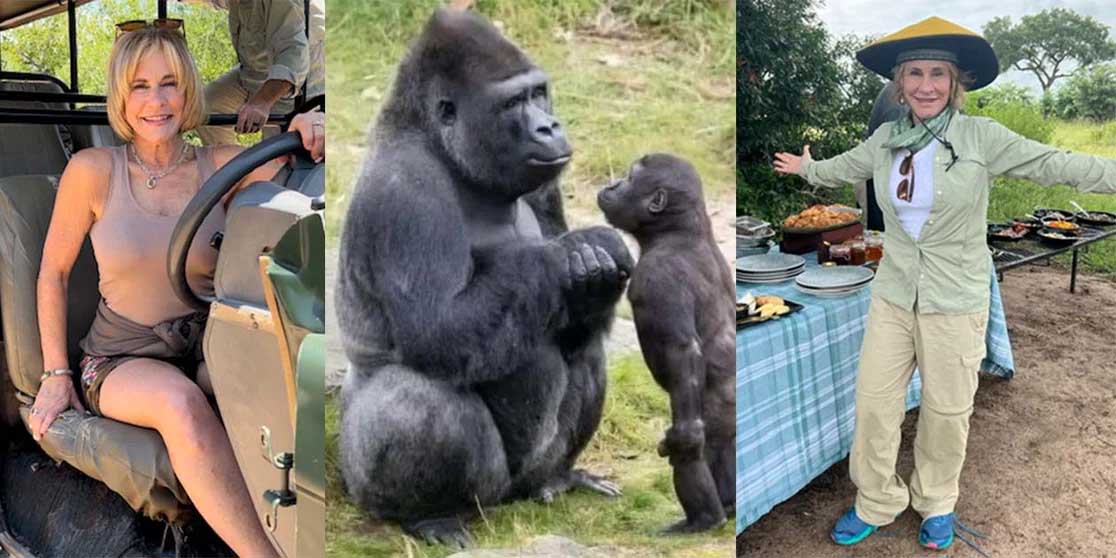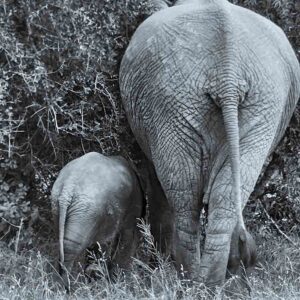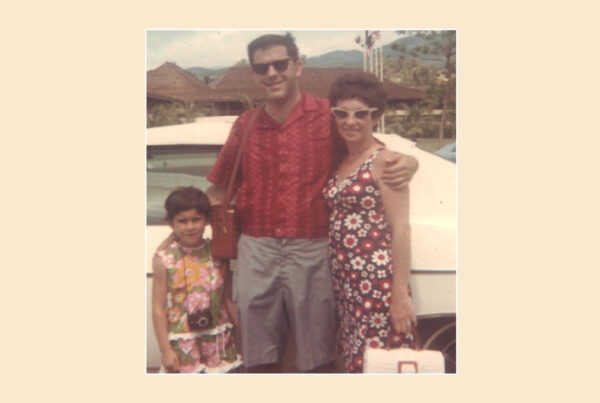
It was a bucket list trip that had been postponed for three years due to COVID, but our trip to the South African Bush was well worth the wait. South Africa is known for its variety: Three capitals, eleven official languages, 20 national parks and a diversity of animals seen nowhere else on the planet. We can learn a lot from the savannah: the way animals adapt to their surroundings and the characteristics they need to survive and thrive in the most competitive environment on earth.
Here’s what we can learn from the Savannah:
1: Elephants
 When a baby elephant dies, its mother has been known to lift it with her trunk and cover the body with ground debris like twigs, sticks, and dirt. Upon completion, the rest of the herd will join the mother in paying homage. Empathy in elephants, the idea that “emotions are contagious,” is backed by science.
When a baby elephant dies, its mother has been known to lift it with her trunk and cover the body with ground debris like twigs, sticks, and dirt. Upon completion, the rest of the herd will join the mother in paying homage. Empathy in elephants, the idea that “emotions are contagious,” is backed by science.
Last month, I had the pleasure of speaking alongside researcher and author Sean Achor. He revealed that while one anxious passenger at an airport gate can cause the entire lineup of travelers to exhibit stress, the opposite is also true. When just one or two employees engage in positive daily rituals such as gratitude exercises, and small acts of kindness, the entire culture is affected. Yes, one person’s actions can create a boomerang effect of happiness and productivity throughout the entire company. Often sellers confide in me, “I don’t have that much empathy; I’m not wired that way.”
Suppose you want to develop elephant-like empathy; act on that. The one thing people often miss is: “The way you act shapes the way you feel.” If you act with empathy, then immediately, you’ll build empathy. Ask more questions, listen, and look interested. When you Slow down, you’ll start to feel differently. If you want to feel differently, act differently. If you want to sell more, lead with empathy.
2. Leopards
 We were fortunate to get close enough to see the rosettes on this female, the spots that uniquely define her.
We were fortunate to get close enough to see the rosettes on this female, the spots that uniquely define her.
We couldn’t help noticing her burgeoning belly. One of the most solitary animals in the bush, the leopard, typically hunts every 13 to 18 days. They stash their meat in trees to safeguard it from predators.
The guide told us that she had likely just eaten and was enjoying time in the sun to digest. I asked, “If she spots additional prey before her food runs out, will she go after it? The guide replied, “Absolutely, after all, she is a hunter.”
How disciplined are we when it comes to hunting for new prospects? It’s easy to put off sending emails, cold calling and stalking new territories, but like the leopard, this is the lifeblood of your business:
• Set Aside Time to Prospect: Prospecting is an easy thing to neglect; like doing the laundry, it piles up. Prospect first thing in the morning before checking your email. Set aside time on your calendar and turn off all notifications.
• Identify Your Target Market. Leopards don’t eat insects and birds. Savvy sellers know their target markets: The size, persona and type of accounts that will feed them for days and often years.
• Do Your Homework: Balance quantity with quality. It’s better to personalize your outreach and call fewer clients than to dial for dollars and spray and prey.
• Use a Pattern Interrupt: “Got a minute? Quick question?” These spammy email openers likely cause you to hit the delete button faster than a hungry Cheetah. Scrutinize the emails you delete. You don’t have to be better, but you do have to be different. Try a pattern interrupt.
3. A Pride of Lions

It turns out Lions, unlike their Leopards cousins, prefer socializing to a life of solitary confinement. African lions have been admired throughout history as symbols of courage and strength. At its core, selling requires a mix of both empathy and courage. Yes, you need to build empathy, but you need to ask difficult questions too. Uncovering obstacles in your discovery requires courage: Here’s a crazy idea. What if you bring up an objection first?
Getting through the “no’s” in your life takes courage. But keep in mind: the word “courage” originates from the root “cor”—the Latin word for heart. When you care enough about your product, your customers, and yourself, your heart will outweigh your fear. The life of a seller requires courage, patience, persistence, empathy, openness, and the ability to deal with rejection. It requires the ability to be alone in thought at times and the necessity of going out and conquering wild new territories. To be disciplined and, at the same time, take risks. It’s not necessarily the most gifted who survive and thrive; or the ones who focus on the next deal (I think of these as short sprinters), but the ones who are consistent, who endure and do a lot of little things right.




